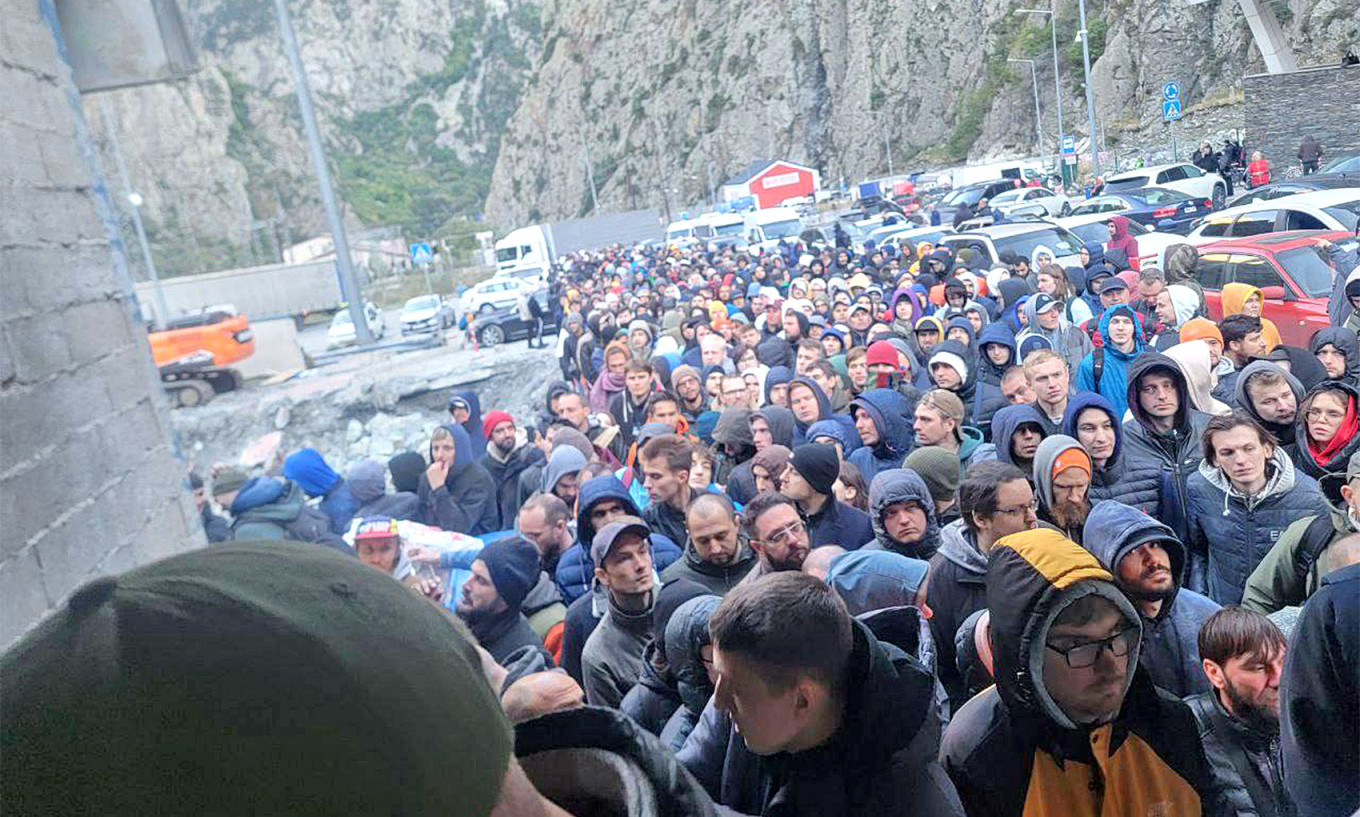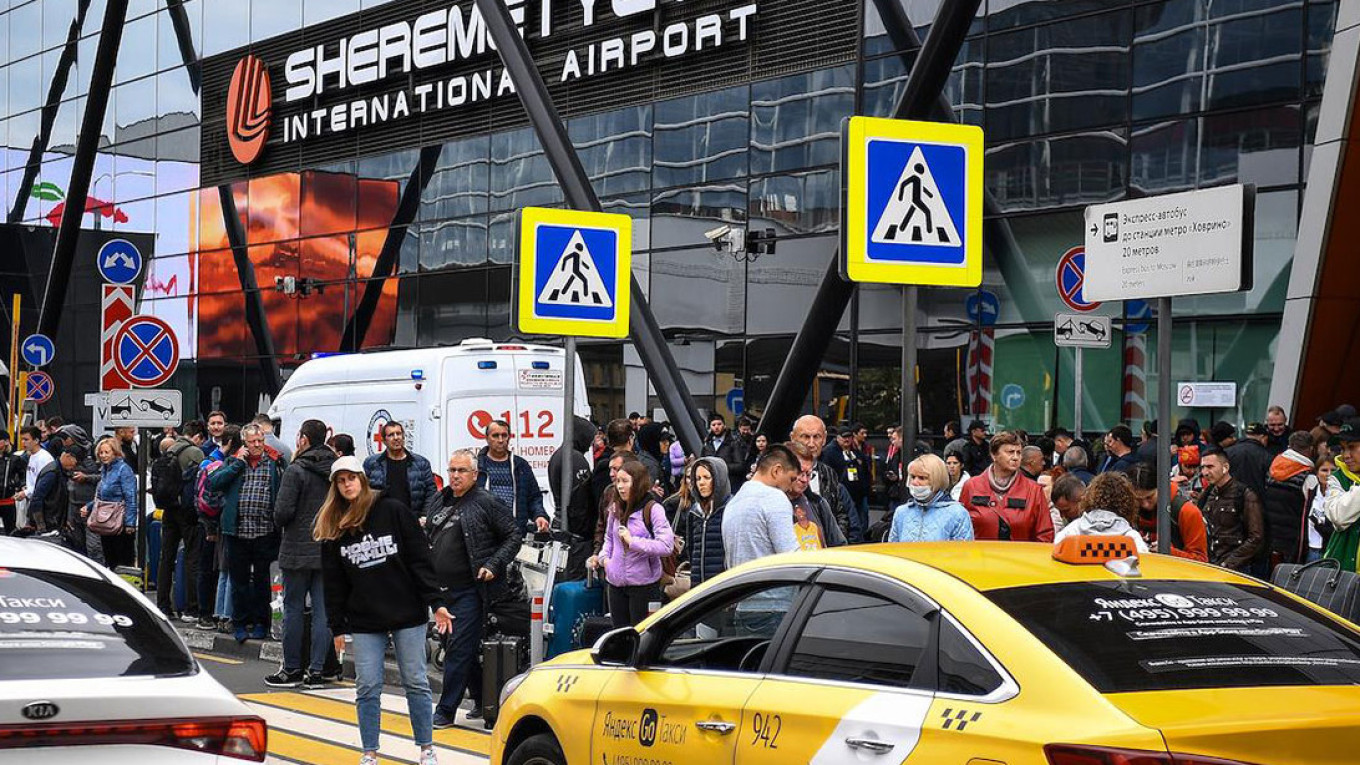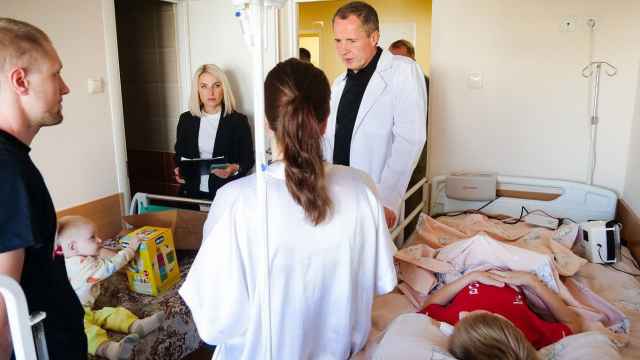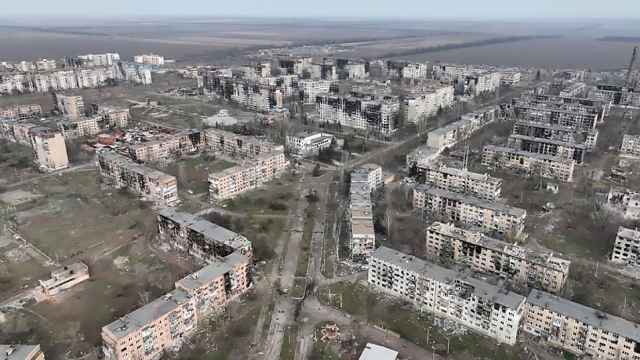Muscovite Rodion decided to flee to the South Caucasus nation of Georgia to avoid being conscripted into the Russian army a few hours after mobilization was announced last week by President Vladimir Putin.
“By the end of that day, I had packed my belongings, given some instructions to my mother and left Moscow,” said Rodion, 30. “The emotions were really overwhelming.”
After driving 2,000 kilometers, dodging police checkpoints and waiting in an enormous line of cars at the border, he finally arrived in the Georgian capital Tbilisi over the weekend.
“I knew that time was running out,” Rodion told The Moscow Times of his desperate journey through central and southern Russia.
Tens of thousands of conscription-age Russian men like Rodion have fled to neighboring countries in recent days amid growing fears that the Kremlin is likely to impose an exit ban in an attempt to retain manpower reserves.
Russia could close its borders to those eligible for mobilization as early as Wednesday, independent media outlet Meduza reported Sunday, citing sources.
The sense of a closing window has led to unruly scenes on Russia’s land borders with Georgia, Kazakhstan and Mongolia — countries that do not require a visa for visiting Russians. In particular, there has been a crush at Russia’s sole border crossing with Georgia in the foothills of the greater Caucasus mountains.
“Many people decided to abandon their cars, they have no water, no fuel, nothing,” a Russian man at the Russian-Georgian border who wished to stay anonymous told The Moscow Times on Monday.

“It’s total chaos,” said Rodion, who finally crossed the border Saturday after waiting 34 hours in a nine-kilometer traffic jam.
There were about 3,500 cars lined up at the border crossing point Monday, according to local officials. And several men at the border told The Moscow Times that they had seen Russian troops on an armored personnel carrier.
“There are no gas stations. The nearest toilet is two kilometers from the border. We had to defend our place in line. It felt like a battle,” said Rodion.
Even before arriving at the border, Rodion said he was stopped by police and was obliged to take an alternative route, driving along a back road at night in the pouring rain.
Some people even crossed the border with Georgia on scooters and bicycles to bypass the large crowds and traffic jams.
In the four days since the announcement of Russia's first mobilization since World War II, about 260,000 men of military age have left the country, independent media outlet Novaya Gazeta Europe reported Sunday, citing a Kremlin source.
With tightened entry requirements for European Union countries bordering Russia, most of those leaving the country have been heading for the South Caucasus nations of Georgia and Armenia as well as Belarus, Turkey and Central Asian countries.
“It took me only 30 minutes to make the decision to fly out of the country,” said one 30-year-old Muscovite, who requested anonymity to speak freely.
“I don’t want to die for nothing.”
Messaging app Telegram has been a key source of information for those fleeing, and one channel set up to inform people about the situation at the Russia-Georgia border has more than doubled its subscribers in five days to over 127,000 people.
Direct flights from major Russian cities to countries that do not require a visa for Russians sold out last week, with tickets on some routes changing hands for 10 times their normal price.
Flights from Moscow to the Azerbaijani capital Baku were advertised for about 665,000 rubles ($11,314) over the weekend.
“It’s a miracle that I managed to buy my plane ticket yesterday,” said one Russian man who arrived in the Armenian capital of Yerevan on Monday and requested anonymity.
He added that the ticket cost the same as a good quality used car.
Plane and train tickets sold out even faster than in early March, when tens of thousands fled the country in the wake of the invasion of Ukraine, according to Irina Lobanovskaya, who last week set up an online guide for those wanting to leave.
“This time there is no doubt that there is a war, that it is real,” Lobanovskaya said.
Kremlin spokesman Dmitry Peskov told journalists Monday that “no decisions” had been taken on stopping conscription-age men from leaving the country.
But Russian men who recently exited the country told The Moscow Times that Russian border guards had questioned them about their military service record.
Lists of men issued with draft papers have been sent to border guards at airports and land crossings, independent media outlet The Bell reported Monday.
While Putin declared a “partial” mobilization last week, fears that the mobilization could be much broader than announced mean that even those without any military experience, or those medically unfit for combat, have packed their bags in recent days.
Novaya Gazeta Europe reported Thursday that a secret clause on the Kremlin’s mobilization decree allows the Defense Ministry to call up 1,000,000 people — instead of the 300,000 promised by Defense Minister Sergei Shoigu.
“I think they will call up everyone,” said Anton, 34, who declined to give his surname and said he took a plane to Tajikistan at the weekend.
Daniil Arkhipov, 24, told The Moscow Times that he has no experience in the Russian Armed Forces and is unfit for military service — but he fled the country anyway.
“There’s no logic. I noticed that there were a lot of men aged from 20 to 40 on my plane,” said Arkhipov, who is now in the Central Asian state of Kyrgyzstan.
With thousands of Russian men already mobilized and the war in Ukraine showing few signs of turning in Russia’s favor in the near future, many of those exiting the country have no illusions that they will be able to go home any time soon.
“It’s a one-way ticket, I know that it’s not temporary,” the Muscovite said.
"It’s very painful."
A Message from The Moscow Times:
Dear readers,
We are facing unprecedented challenges. Russia's Prosecutor General's Office has designated The Moscow Times as an "undesirable" organization, criminalizing our work and putting our staff at risk of prosecution. This follows our earlier unjust labeling as a "foreign agent."
These actions are direct attempts to silence independent journalism in Russia. The authorities claim our work "discredits the decisions of the Russian leadership." We see things differently: we strive to provide accurate, unbiased reporting on Russia.
We, the journalists of The Moscow Times, refuse to be silenced. But to continue our work, we need your help.
Your support, no matter how small, makes a world of difference. If you can, please support us monthly starting from just $2. It's quick to set up, and every contribution makes a significant impact.
By supporting The Moscow Times, you're defending open, independent journalism in the face of repression. Thank you for standing with us.
Remind me later.







